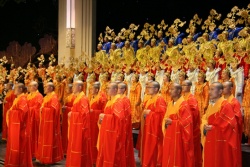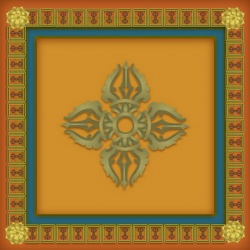Difference between revisions of "Cālāsuttaṁ: The Discourse about Cālā"
(Created page with "<nomobile>{{DisplayImages|2535|2140|744|1664|2849|4323|1650|41}}</nomobile> {{Centre|<big><big>Cālāsuttaṁ<br/> The Discourse about Cālā </big></big>}} 167. Evaṁ m...") |
|||
| Line 1: | Line 1: | ||
| − | <nomobile>{{DisplayImages | + | <nomobile>{{DisplayImages|2140|1664}}</nomobile> |
{{Centre|<big><big>[[Cālāsuttaṁ]]<br/> | {{Centre|<big><big>[[Cālāsuttaṁ]]<br/> | ||
The Discourse about Cālā </big></big>}} | The Discourse about Cālā </big></big>}} | ||
| Line 6: | Line 6: | ||
Thus I have heard: | Thus I have heard: | ||
| − | ekaṁ samayaṁ Bhagavā Sāvatthiyaṁ viharati | + | ekaṁ samayaṁ [[Bhagavā]] Sāvatthiyaṁ viharati |
| − | at one time the Gracious One was dwelling near Sāvatthī | + | at one time the Gracious One was dwelling near [[Sāvatthī]] |
| − | Jetavane Anāthapiṇḍikassa ārāme. | + | [[Jetavane]] Anāthapiṇḍikassa ārāme. |
| − | at Anāthapiṇḍika's grounds in Jeta's Wood. | + | at Anāthapiṇḍika's grounds in Jeta's [[Wood]]. |
| − | Atha kho Cālā bhikkhunī, pubbaṇhasamayaṁ nivāsetvā, | + | Atha kho [[Cālā]] [[bhikkhunī]], pubbaṇhasamayaṁ nivāsetvā, |
| − | Then the nun Cālā, having dressed in the morning time, | + | Then the [[nun]] [[Cālā]], having dressed in the morning time, |
pattacīvaram-ādāya, Sāvatthiṁ piṇḍāya pāvisi. | pattacīvaram-ādāya, Sāvatthiṁ piṇḍāya pāvisi. | ||
| − | after picking up her bowl and robe, was entering Sāvatthī for alms. | + | after picking up her [[bowl]] and robe, was entering [[Sāvatthī]] for [[alms]]. |
Sāvatthiyaṁ piṇḍāya caritvā, pacchābhattaṁ piṇḍapātapaṭikkantā, | Sāvatthiyaṁ piṇḍāya caritvā, pacchābhattaṁ piṇḍapātapaṭikkantā, | ||
| − | After walking for alms in Sāvatthī, and returning from the alms-round after the meal, | + | After walking for [[alms]] in [[Sāvatthī]], and returning from the [[alms-round]] after the meal, |
yena Andhavanaṁ tenupasaṅkami divāvihārāya, | yena Andhavanaṁ tenupasaṅkami divāvihārāya, | ||
| − | she approached the Blind Man's Wood to pass the day, | + | she approached the [[Blind]] Man's [[Wood]] to pass the day, |
Andhavanaṁ ajjhogahetvā, | Andhavanaṁ ajjhogahetvā, | ||
| − | and having entered Blind Man's Wood, | + | and having entered [[Blind]] Man's [[Wood]], |
aññatarasmiṁ rukkhamūle divāvihāraṁ nisīdi. | aññatarasmiṁ rukkhamūle divāvihāraṁ nisīdi. | ||
| − | she sat down at the root of a certain tree to pass the day. | + | she sat down at the [[root]] of a certain [[tree]] to pass the day. |
| − | Atha kho Māro Pāpimā yena Cālā bhikkhunī tenupasaṅkami, | + | Atha kho Māro Pāpimā yena [[Cālā]] [[bhikkhunī]] tenupasaṅkami, |
| − | Then the Wicked Māra approached the nun Cālā, | + | Then the Wicked [[Māra]] approached the [[nun]] [[Cālā]], |
upasaṅkamitvā Cālaṁ bhikkhuniṁ etad-avoca: | upasaṅkamitvā Cālaṁ bhikkhuniṁ etad-avoca: | ||
| − | and after approaching he said this to the nun Cālā: | + | and after approaching he said this to the [[nun]] [[Cālā]]: |
| − | “Kiṁ nu tvaṁ, bhikkhuni, na rocesī?” ti | + | “Kiṁ nu tvaṁ, [[bhikkhuni]], na rocesī?” ti |
| − | “With what, nun, are you not pleased?” | + | “With what, [[nun]], are you not [[pleased]]?” |
“Jātiṁ khvāhaṁ, āvuso, na rocemī.” ti | “Jātiṁ khvāhaṁ, āvuso, na rocemī.” ti | ||
| − | “I am not pleased, friend, with birth.” | + | “I am not [[pleased]], [[friend]], with [[birth]].” |
“Kiṁ nu jātiṁ na rocesi? Jāto kāmāni bhuñjati, | “Kiṁ nu jātiṁ na rocesi? Jāto kāmāni bhuñjati, | ||
| − | “Why is it you're not pleased with birth? Being born one enjoys pleasures, | + | “Why is it you're not [[pleased]] with [[birth]]? Being born one enjoys [[pleasures]], |
| − | Ko nu taṁ idam-ādapayi: 'Jātiṁ mā roca, bhikkhunī'?” ti | + | Ko nu taṁ idam-ādapayi: 'Jātiṁ mā roca, [[bhikkhunī]]'?” ti |
| − | Just who made you agree to this: <ref>{{Nolinking|Comm: ko nu taṁ idamādapayī ti ko nu mandabuddhi bālo taṁ evaṁ gāhāpesi? }}just who made you agree to this means which fool of dull intellect made you seize on this?</ref> 'Do not be pleased with birth, nun'?” | + | Just who made you agree to this: <ref>{{Nolinking|Comm: ko nu taṁ idamādapayī ti ko nu mandabuddhi bālo taṁ evaṁ gāhāpesi? }}just who made you agree to this means which fool of dull {{Wiki|intellect}} made you seize on this?</ref> 'Do not be [[pleased]] with [[birth]], [[nun]]'?” |
“Jātassa maraṇaṁ hoti, jāto dukkhāni phussati, | “Jātassa maraṇaṁ hoti, jāto dukkhāni phussati, | ||
| − | “For one who is born there is death, being born one feels suffering, | + | “For one who is born there is [[death]], being born one [[feels]] [[suffering]], |
Bandhaṁ vadhaṁ pariklesaṁ, tasmā jātiṁ na rocaye. | Bandhaṁ vadhaṁ pariklesaṁ, tasmā jātiṁ na rocaye. | ||
| − | (There is) bondage, murder, hardship, <ref>{{Nolinking|Comm: pariklesan-ti aññam-pi nānappakāraṁ upaddavaṁ. Idāni yaṁ Māro āha: “Ko nu taṁ idam-ādapayī?” ti Taṁ maddantī: “Na maṁ andhabālo ādapesi, loke pana aggapuggalo Satthā dhammaṁ desesī” ti dassetuṁ. Buddho ti-ādim-āha;}} hardship means manifold calamities. Now this is what Māra said: “Just who made you agree to this?” To show how she rejects that: “No blind fool made me agree, but the greatest man in the world, the Teacher who taught the Dhamma.” (So) The Awakened One and so on is said.</ref> therefore I am not pleased with birth. | + | (There is) bondage, murder, hardship, <ref>{{Nolinking|Comm: pariklesan-ti aññam-pi nānappakāraṁ upaddavaṁ. Idāni yaṁ Māro āha: “Ko nu taṁ idam-ādapayī?” ti Taṁ maddantī: “Na maṁ andhabālo ādapesi, loke pana aggapuggalo Satthā dhammaṁ desesī” ti dassetuṁ. Buddho ti-ādim-āha;}} hardship means manifold {{Wiki|calamities}}. Now this is what [[Māra]] said: “Just who made you agree to this?” To show how she rejects that: “No [[blind]] fool made me agree, but the greatest man in the [[world]], the [[Teacher]] who [[taught]] the [[Dhamma]].” (So) [[The Awakened One]] and so on is said.</ref> therefore I am not [[pleased]] with [[birth]]. |
| − | Buddho Dhammam-adesesi, jātiyā samatikkamaṁ, | + | [[Buddho]] Dhammam-adesesi, jātiyā samatikkamaṁ, |
| − | The Awakened One taught the Dhamma, the transcendence of birth (and death), | + | [[The Awakened One]] [[taught]] the [[Dhamma]], the {{Wiki|transcendence}} of [[birth]] (and [[death]]), |
Sabbadukkhappahānāya, so maṁ Sacce nivesayi. | Sabbadukkhappahānāya, so maṁ Sacce nivesayi. | ||
| − | For giving up of all suffering, he has established me in the Truth. <ref>{{Nolinking|Comm: tattha Sacce nivesayī ti paramatthasacce nibbāne nivesesi; }}herein, he has established (me) in the Truth means he has established (me) in the highest truth, in Emancipation.</ref> | + | For giving up of all [[suffering]], he has established me in the [[Truth]]. <ref>{{Nolinking|Comm: tattha Sacce nivesayī ti paramatthasacce nibbāne nivesesi; }}herein, he has established (me) in the [[Truth]] means he has established (me) in [[the highest truth]], in {{Wiki|Emancipation}}.</ref> |
| − | Ye ca rūpūpagā sattā, ye ca arūpaṭhāyino, | + | Ye ca rūpūpagā [[sattā]], ye ca arūpaṭhāyino, |
| − | (There are) those beings attached to form, those (attached to) formless states, | + | (There are) those [[beings]] [[attached]] to [[form]], those ([[attached]] to) [[formless states]], |
Nirodhaṁ appajānantā, āgantāro punabbhavan.”-ti | Nirodhaṁ appajānantā, āgantāro punabbhavan.”-ti | ||
| − | (And) those who know not cessation, <ref>{{Nolinking|Comm: nirodhaṁ appajānantā ti nirodhasaccaṁ ajānantā; }}those know not cessation means those who do not know the truth of cessation.</ref> they (all) come to rebirth again.” | + | (And) those who know not [[cessation]], <ref>{{Nolinking|Comm: nirodhaṁ appajānantā ti nirodhasaccaṁ ajānantā; }}those know not [[cessation]] means those who do not know the [[truth]] of [[cessation]].</ref> they (all) come to [[rebirth]] again.” |
| − | Atha kho Māro Pāpimā: | + | Atha kho Māro Pāpimā: “[[Jānāti]] maṁ [[Cālā]] [[bhikkhunī]]!” ti |
| − | Then the Wicked Māra (thought): “The nun Cālā knows me!” | + | Then the Wicked [[Māra]] ([[thought]]): “The [[nun]] [[Cālā]] [[knows]] me!” |
dukkhī dummano tatthevantaradhāyī ti. | dukkhī dummano tatthevantaradhāyī ti. | ||
| − | and pained and depressed he vanished right there. | + | and pained and {{Wiki|depressed}} he vanished right there. |
</poem> | </poem> | ||
Latest revision as of 13:33, 16 May 2015
Cālāsuttaṁ
The Discourse about Cālā
167. Evaṁ me sutaṁ: Thus I have heard:
ekaṁ samayaṁ Bhagavā Sāvatthiyaṁ viharati at one time the Gracious One was dwelling near Sāvatthī
Jetavane Anāthapiṇḍikassa ārāme. at Anāthapiṇḍika's grounds in Jeta's Wood.
Atha kho Cālā bhikkhunī, pubbaṇhasamayaṁ nivāsetvā, Then the nun Cālā, having dressed in the morning time,
pattacīvaram-ādāya, Sāvatthiṁ piṇḍāya pāvisi. after picking up her bowl and robe, was entering Sāvatthī for alms.
Sāvatthiyaṁ piṇḍāya caritvā, pacchābhattaṁ piṇḍapātapaṭikkantā, After walking for alms in Sāvatthī, and returning from the alms-round after the meal,
yena Andhavanaṁ tenupasaṅkami divāvihārāya, she approached the Blind Man's Wood to pass the day,
Andhavanaṁ ajjhogahetvā, and having entered Blind Man's Wood,
aññatarasmiṁ rukkhamūle divāvihāraṁ nisīdi. she sat down at the root of a certain tree to pass the day.
Atha kho Māro Pāpimā yena Cālā bhikkhunī tenupasaṅkami, Then the Wicked Māra approached the nun Cālā,
upasaṅkamitvā Cālaṁ bhikkhuniṁ etad-avoca: and after approaching he said this to the nun Cālā:
“Kiṁ nu tvaṁ, bhikkhuni, na rocesī?” ti “With what, nun, are you not pleased?”
“Jātiṁ khvāhaṁ, āvuso, na rocemī.” ti “I am not pleased, friend, with birth.”
“Kiṁ nu jātiṁ na rocesi? Jāto kāmāni bhuñjati, “Why is it you're not pleased with birth? Being born one enjoys pleasures,
Ko nu taṁ idam-ādapayi: 'Jātiṁ mā roca, bhikkhunī'?” ti Just who made you agree to this: [1] 'Do not be pleased with birth, nun'?”
“Jātassa maraṇaṁ hoti, jāto dukkhāni phussati, “For one who is born there is death, being born one feels suffering,
Bandhaṁ vadhaṁ pariklesaṁ, tasmā jātiṁ na rocaye. (There is) bondage, murder, hardship, [2] therefore I am not pleased with birth.
Buddho Dhammam-adesesi, jātiyā samatikkamaṁ, The Awakened One taught the Dhamma, the transcendence of birth (and death),
Sabbadukkhappahānāya, so maṁ Sacce nivesayi. For giving up of all suffering, he has established me in the Truth. [3]
Ye ca rūpūpagā sattā, ye ca arūpaṭhāyino, (There are) those beings attached to form, those (attached to) formless states,
Nirodhaṁ appajānantā, āgantāro punabbhavan.”-ti (And) those who know not cessation, [4] they (all) come to rebirth again.”
Atha kho Māro Pāpimā: “Jānāti maṁ Cālā bhikkhunī!” ti Then the Wicked Māra (thought): “The nun Cālā knows me!”
dukkhī dummano tatthevantaradhāyī ti. and pained and depressed he vanished right there. </poem>
Footnotes
- ↑ Comm: ko nu taṁ idamādapayī ti ko nu mandabuddhi bālo taṁ evaṁ gāhāpesi? just who made you agree to this means which fool of dull intellect made you seize on this?
- ↑ Comm: pariklesan-ti aññam-pi nānappakāraṁ upaddavaṁ. Idāni yaṁ Māro āha: “Ko nu taṁ idam-ādapayī?” ti Taṁ maddantī: “Na maṁ andhabālo ādapesi, loke pana aggapuggalo Satthā dhammaṁ desesī” ti dassetuṁ. Buddho ti-ādim-āha; hardship means manifold calamities. Now this is what Māra said: “Just who made you agree to this?” To show how she rejects that: “No blind fool made me agree, but the greatest man in the world, the Teacher who taught the Dhamma.” (So) The Awakened One and so on is said.
- ↑ Comm: tattha Sacce nivesayī ti paramatthasacce nibbāne nivesesi; herein, he has established (me) in the Truth means he has established (me) in the highest truth, in Emancipation.
- ↑ Comm: nirodhaṁ appajānantā ti nirodhasaccaṁ ajānantā; those know not cessation means those who do not know the truth of cessation.

